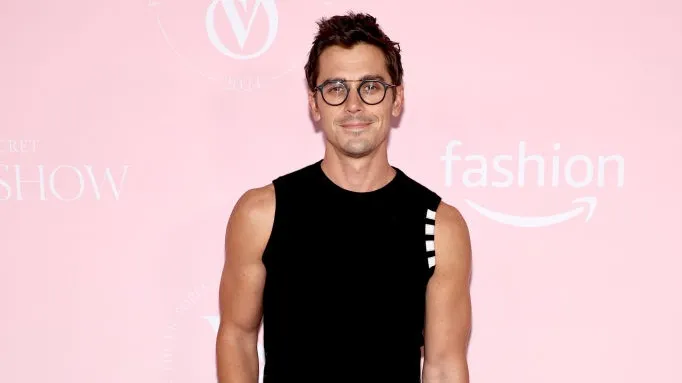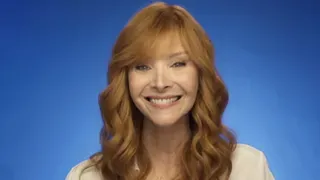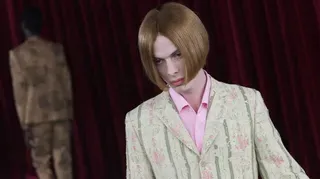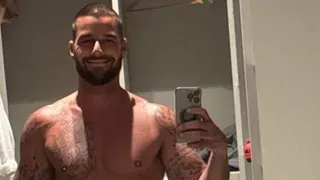October 20, 2008
Marcus Ewert Talks Trans-kid Book: '10,000 Dresses' Breaks New Ground
Kilian Melloy READ TIME: 12 MIN.
It was a caption that was good, but didn't take the prize: a man looks at a clock where the numbers have been replaced with random symbols and says into the phone, "Let me call you back in an umlaut."
The gag appeared in one of The New Yorker's weekly caption contests. The drawing was the work of a New Yorker magazine artist; the caption was the contribution of San Francisco resident Marcus Ewert, a writer whose work has varied from the heroic to the biographical, and is now set to make publishing history.
Another contestant's caption eventually took the top honor ("The hours here are obscene"), but Ewert's idea made the top three. Meantime, the writer had other projects to think about--including a sweet kids' book about a little girl named Bailey who dreams every night about the impossible, but gorgeous, dresses she would like to create. Hence the book's title: 10,000 Dresses.
Bailey was born to haute couture. She was also, as it turns out, born into the body of a little boy: something that neither her parents nor her older brother understands.
The topic of transgendered people is a tough one for many individuals to wrap their minds around. Even gays and lesbians may not quite get that gender identity is something distinct from sexual orientation. But like sexual orientation, it's something that the individual knows about him- or herself from deep within; not a choice or an opinion, but a fact as inseparable from the individual as his or her own sense of self, and less apt to change than the flesh with which the transgendered person's identity does not agree.
Bailey is a wonderful creation, but then again so are the dresses she dreams up; the illustrations by Rex Ray have a sleek, artful look, and already the book is drawing raves: designer Isaac Mizrahi has praised it, saying, "I love this book. If I had this book growing up, I might have felt better about my dress-wearing habit."
A few things seem inevitable about 10,000 Dresses. One, religious and social conservatives are going to have an absolute fit about it. Two, kids of any and all persuasions will love it for its flights of imagination and its easy way of talking about a child's experiences without talking down to the children meant as its audience. And three, it's going to be around long after the cultural dust has settled: expect this to be a classic long after anyone has stopped trying to force little girls and boys born in the bodies of the other gender to conform to their physical appearance, rather than letting them be who they really are.
Marcus Ewert chatted with EDGE about the book, and about his own coming-out journey as a gay kid who slept with a couple of America's great writers on his way to becoming a grown-up gay writer in his own right.
EDGE: First off, where are you from, originally? And was it the kind of place a gay man could not feel safe about being honest about who he was?
Marcus Ewert: I was born and raised in Atlanta, Georgia.
Atlanta is definitely a bubble--relatively--in the South, and the particular patch of suburbs I grew up in was even more of a bubble than that: Democrats, white-collar professionals, and transplanted Northerners--all of which described my own parents.
There's also a very large Jewish community--again, not super-typical for the South. All in all, it was a dab of Blue in a Red state, as we would now say. I went to the same small, private school--a fairly hippy-ish school back then--from ages 2 to 18. Dr. Martin Luther King's kids even went there for some time--my older brother and sister were in some of their classes. So I was pretty sheltered; then again, the Ku Klux Klan was very active in the neighboring county; it was hard not to be aware of stuff like that. Those effin' Reagan '80s!
I honestly don't think I would have survived outside of my bubble, though--I think I would have killed myself. As it was, by the time I hit puberty, I had really acute social anxiety. I was deathly afraid of other teenagers. Just going to the mall was agonizing. I was so sure that roving bands of teens would see me, spot my gayness, and come attack me. This never happened to me--I was never even jeered at--but I lived in mortal fear of it all the same.
That said--real life always being more complicated and various than any simple sum-up can convey--I should mention here that from ages 13 to 15 one of my good friends was RuPaul! He was the first person I ever came out to. I had written him a fan letter in '84, when his first album, Sex Freak, came out, and we were phone-buddies for years afterwards.
I was so naive at the time, that in my first letter, I actually told him: "I hope that my being gay doesn't bother you--but I don't think that it will, because you're a performer, and performers are very open-minded about things like homosexuality, and in your world you've probably met and even worked with gay people before!" It literally did not occur to me that Ru might be gay himself--though I had first seen him on public access TV bouncing around in make-up and a dress singing Boom-Shang-A-Lang, Work that Thang!
We'd talk at least once or twice a week, for over two years--well, he'd talk, and I'd listen. So I'd get an earful about the drag and gay and underground music scene of Hotlanta--but I was way too terrified to go out and partake of any of it myself...
EDGE: You've written about your experiences as a teenager traveling to Boulder with the express intention of meeting and sleeping with Allen Ginsberg or William S. Burroughs. (In the fullness of time, you slept with them both.) What compelled you to take that geographical, and sexual, journey?
Marcus Ewert: All that horrible repression I was feeling!
At the time, I was convinced that the whole suburban American environment (liberal though my patch of it might be) was one vast conspiracy to dumb me down, to make me--and everyone, really--less extraordinary, less brilliant, less joyful. I really thought I was being urged to be stupider.
But then I'd read some great poetry, or see a powerful movie, or leaf through an art-book, and think, "This is what's real."
I was dying for that level of intensity you get in really great art. I was positive that somewhere out there, there were all these brilliant people: writers, musicians, filmmakers, dancers, actors, thinkers, spiritual leaders, activists, painters... even martial arts experts! People who were geniuses, who just plain vibrated at a higher frequency than everyone else. People who lived in art, all the time--whose whole lives were art. And I was desperate to get with them! Oh, if only I could leapfrog all the dull mediocre crap, in one fell swoop! It would be like gate-crashing Heaven.
So when I heard about this place in Colorado called Naropa, where there were all these brilliant writers and dancers and musicians and tea ceremony experts and what not, all in one place, and that all I needed to do to get in was to pay a little money... well! You didn't have to tell me twice!
And from all the reading I was doing, I knew that both Ginsberg and Burroughs were into young guys: i.e., teenagers, like me. Allen had even written several poems about getting it on with students of his at Naropa, guys who approached him, so it s like I had a pre-written script just handed to me: How To Get With Allen Ginsberg. In my mind it was a total no-brainer--get to Naropa (where Allen and Burroughs were both teaching)--make a play for one or the other of them, become their boyfriend, and boom!--I'd be in Artist-Heaven from there on out. I saw it as a way of speeding up my own capital-D-Destiny.
Well, maybe makes me sound too mercenary, because the thing was, I really did adore both Allen's and William's writing. If I hadn't liked their work, I never would have made a play for either man.
The weird thing was how well it all actually worked out, for the most part. I mean, Allen and William really were my boyfriends, massive age-difference aside. I was as close to them as I was to anybody. All these years later, even with both men now dead, they still remain two of the most important people in my life, though not always in a positive manner. (Allen initially told me that my writing sucked, for instance. I was scarred by that for years, maybe still am...)
I'd had a little bit of sex before, but Allen was definitely my first boyfriend. I really did like his writing. Especially "Howl." I still think it's this great, epochal, visionary poem. It's powerful. It changes the world.
But the fact that Allen was the most famous poet alive? That didn't hurt.
Finally, I'll just say that it was really easy being with Allen, or with William. I've mentioned how stressed out I was around my own peer-group; but it was so easy to hang out with these old guys; it felt very comfortable and familiar. Plus, through their eyes, I got to experience myself as young and fresh and cute, which was not how I saw myself in general (which was: stiff and musty and forced and contrived...)
EDGE: Even more compelling than your descriptions of sex with Ginsberg and Burroughs are your non-sexual interactions with them: Burroughs pursuing you with a Freddie Krueger knife-fingered glove, for example. Was it your feeling that these people were not just remarkable writers, but remarkable beings in other ways? Was their genius confined to their ability with words, or did it define them as individuals?
Marcus Ewert: OMG, this is a question that will take my whole memoir to answer--it sort of is the central theme of the memoir: Is there really such thing as personal greatness, or genius, and if so, what is it? And how do you come by it? Can anyone? And can you subsequently lose it? And, if so, how?
But here are some of my thoughts on the matter, here and now:
Though both guys were very gifted, they also both had these huge, gaping blind-spots--what you'd call 'character defects' in a 12-Step context.
For instance: in addition to being very lovely and inspired, Allen could be piggish, narcissistic, and just plain clueless--a grumpy old bastard; William was brilliant and debonair and courtly, but also very shut down, very sad and emotionally damaged--just this lonely, lonely figure, deeply lost in himself.
That's me being judgmental, of course, but there you are. As intoxicating as it was to be around these two guys, as glamorous and exotic--it was still hard to ignore the things about their personalities that just didn't work. But when you're as famous as those two guys were, as iconic, there's so much pressure on you not to change who you are. People--your audience, your fans--want to hear you tell the same old story for the thousandth time, deliver your patented personality and shtick, do your little routine.
So--in short--I think genius is very situational. I no longer think it's this rare pure element, like gold, that only a precious few have. Either everyone has it, or no one does.
EDGE: You've had quite a varied career as a published writer: everything from a short story in the anthology Twenty Epics to an entry in The New Yorker's weekly cartoon caption contest. What's your highest goal as a writer--e.g., to write a best selling novel, to author a Hollywood screenplay, to publish a "slim volume" of poetry? All of these and more?
Marcus Ewert: Yeah--all that and more!
There are so many kinds of things I want to write, it's unreal: poems, fantasy/sci-fi novels and short stories, more kids' books, board books for babies, horror screenplays, funny movies (a la Little Miss Sunshine), essays, TV Shows (a la Buffy or Six Feet Under), graphic novels, humorous books, cartoons, my memoir, plays... you name it!
Gosh, what's my highest goal as a writer, though? You know, I guess I'm still a Dungeons & Dragons geek at heart--I want to go on a thrilling, fantastical adventure every time I sit down to write something! (Sadly, this is also a recipe for writer's block!) But it's true--I want to go somewhere I've never been--and bring back treasure. Treasure for myself, anyway, and hopefully for the reader as well!
To keep using Dungeons & Dragons metaphors: I also want my writing to be like magic spells: structured blocks of words that go out into the world and do things, affect things. Little bits of magic that expand room in the world for the things I value: like love, or awe, or compassion, or beauty, or delight...
I can't control whether the spells succeed or not, however!
EDGE: Your latest foray into publishing is a kids' book called 10,000 Dresses, which is about a transgendered boy who dreams of the many fabulous dresses he'd like to wear. Say a bit, if you would, about what went into creating that book.
Marcus Ewert: Well, first I would restate your description of the book, and say that it's about a transgendered girl, and the dresses that she'd like to wear. That is to say: Bailey's assigned gender is male, but her affirmed gender is female. Who she is for herself is female. Unfortunately, one of her biggest struggles is that (almost) everyone in her life is always saying to her, "Oh no, no, no--you're definitely a boy."
As to what went into creating the book? My own lifelong joys and struggles with my own gender, and other people's, and capital G Gender in general. It's so hard for me to be succinct here, re. what gender means to me--even what I feel my own gender to be.
Although the transgender stuff is probably what will draw the most attention to the book, to me the story is equally about being an artist. (Which to my mind we all are, one way or another--but that's a whole other topic!)
So, this book is equally about what happens when you have these beautiful dreams, or visions, or ideas/ideals, and the people around you absolutely don't want to hear about it. Which--you know--happens a lot in the real world. And then, on the flipside, the story shows what happens when you finally do find someone who's inspired by you, how wonderful that is.
My friend Danny Nicoletta likes to use the term "the believing mirror." Someone who can reflect you back as fantastic, honorable, wonderful, and not the horrible stinking mess that you sometimes fear you are. So to me the two themes of this book are: gender and art. Identity and Art.
It was very, very important to me that the book not just be an "issue book'," i.e., a "Let's All Be Tolerant Of Issue X" book. I think issue books are rather horrible and insulting, really. It's horrible to reduce people down to just one facet of their being--as if we weren't all huge and complex and subtly nuanced...
I don't know--maybe there are people who don't have any nuances or contradictions--but I ain't met 'em.
And I also wanted the book to not be apologetic. Bailey's happiness may be compromised by how other people interact with her, but her self-worth never is. This is not an assimilationist "We're Just Like You" book! It doesn't end with Bailey changing to fit into the status quo.
Finally, this is also a book about how cool it would be to have dresses made out of things like flowers, crystals, and magic windows!
EDGE: When it comes to kids' books, there are lots of books on gay people now that serve as a resource for children: And Tango Makes Three, My Uncle's Wedding, King and King. But this is the first time I have heard of a book that addresses the subject of someone feeling that they another sex, different from their biological gender. Was there any resistance from publishers or agents regarding the subject matter?
Marcus Ewert: No, there hasn't been, quite the opposite--but that's really because we've been blessed with such a progressive publisher. If you read the list of Seven Stories' authors, it's like a who's who of the Left's intelligentsia.
Rex is the one who has the strongest connections there, so I mostly heard the reports second-hand, but from what he said, it sounded like they jumped at the chance to publish our book. And they have been so supportive the whole way through--and this at a time when the book-world in general is becoming ever more crushingly corporate and bestseller-driven.
To work with such a cool, independent press is such a godsend. I couldn't be happier. It's kind of ridiculous how wonderful it's all been, how charmed.
EDGE: What was your creative process when it came to working together with the book's illustrator?
Marcus Ewert: Stay out of his way, and let him work his magic!
Mostly, I just hung out not-so-very patiently, while he camped out in studio, and did his stuff in private. Although we're buddies, and have been for many years, I gave him almost zero input on what he was doing. I knew I wouldn't need to, with someone as brilliant as him.
That said, in writing the story, I tried to leave the descriptions very open-ended, so that the illustrator could really go to town, do whatever he wanted. That's always the line you walk with picture books: you want the language to be beautiful and evocative, but not try to convey info that the illustrations can convey better. It really is a very cool art form, picture books.
Rex did such a great job--I think I'm going to be spoiled for life. I'm going to always want illustrations for any book that I do to be his knock-out as his are.
EDGE: One last question... what's this about you reading Tarot cards?
Marcus Ewert: Yup--I read cards professionally. And I'm gooood...
Marcus Ewert is now at work on a memoir about his teenage years among several of the Beat writers.
Kilian Melloy serves as EDGE Media Network's Associate Arts Editor and Staff Contributor. His professional memberships include the National Lesbian & Gay Journalists Association, the Boston Online Film Critics Association, The Gay and Lesbian Entertainment Critics Association, and the Boston Theater Critics Association's Elliot Norton Awards Committee.






